#Live at Moore Theatre
Photo





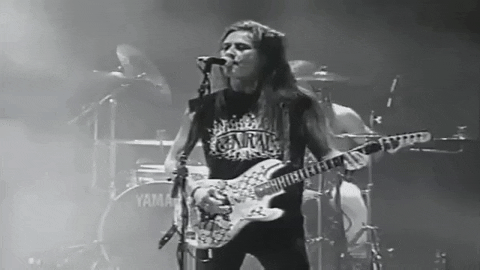
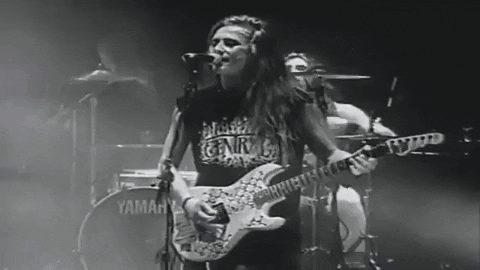

I'm the man in the box
Buried in my shit
Won't you come and save me, save me
Feed my eyes, can you sew them shut?
Jesus Christ, deny your maker
He who tries, will be wasted
Feed my eyes now you've sewn them shut
Alice In Chains - Man In The Box (Live at Moore Theatre) (1990)
#alice in chains#facelift#man in the box#Live at Moore Theatre#1990#Live Facelift#Filmed live on December 22nd 1990 at The Moore Theatre in Seattle Washington.#1991#Release date: 1991#Video#Genre: Heavy Metal/Grunge#Themes: Depression Drugs Suicide Death Pain Inner struggles#USA#my edit#my gif#b&w
87 notes
·
View notes
Audio
Live version of Organ Farmer by King Gizzard & The Lizard Wizard from the collection album Infest The Rats' Nest Live
#music#australian music#king gizzard & the lizard wizard#michael cavanagh#cook craig#stu mackenzie#eric moore#ambrose kenny smith#lucas harwood#joey walker#jason galea#jonah mociun#live#live music#concert#adelaide#thebarton theatre#king gizzard and the lizard wizard
27 notes
·
View notes
Text
i haven’t done a tag game in forever so this was super fun. guess what my favourite music genres are lmao. shout out to @alilfroginacove for the tag!!
shuffle your ‘On Repeat’ playlist and list the first 10 songs that play, then tag 10 people
“Jesse Got Trapped in a Coal Mine” by Goodnight, Texas
“The Chain” by Ingrid Michaelson
“Somethin’ Bout A Truck” by Kip Moore (this is because i replay his song “Beer Money” constantly and this is the song that almost always follows it up)
“Friends on the Other Side (Disney Villain Mash-Up)” by Thomas Sanders
“Le réel” by Gang Of Youths
“Way of the Triune God - Hallelujah Version” by Tyler Childers
“Dearest Sarah” by Goodnight, Texas
“Diane” by Cam
“Sold (The Grundy County Auction Incident)” by John Michael Montgomery
“Panthers on the Mountainside Live at Howard Theatre” by John Charles Dwyer, Michele Buzbee, and Sarah Doreen Macphee
alrighty uhhh hey mutuals here we go. no pressure for this of course @aranealux @lastwave @dynastesdyke @transsexual-dandelions @you-are-constance @breadluvr49 @antichrists-little-brother @haniawritesthings @disabled-dragoon @markedbyindecision
#tag game#the amount of country and folk on this playlist.#i thought there’d be more theatre bc i was relistening to ‘bring it on’ a bunch but i guess that’s not counting as being replayed
137 notes
·
View notes
Text
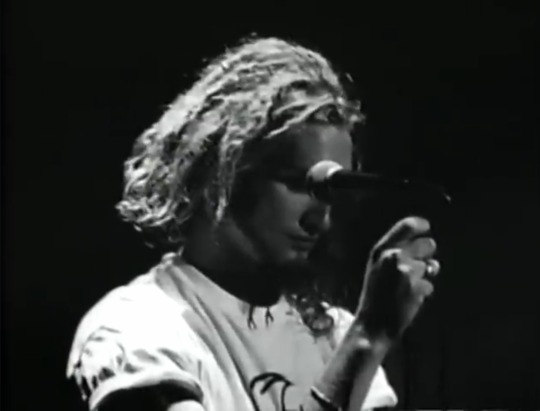


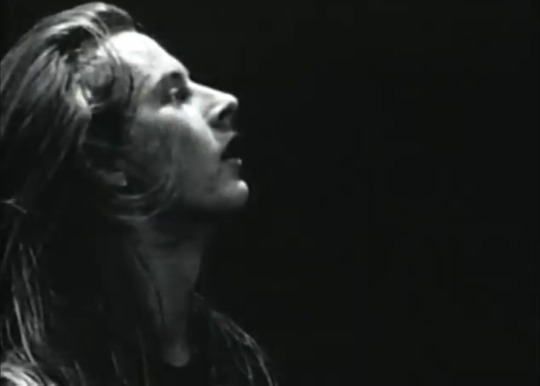


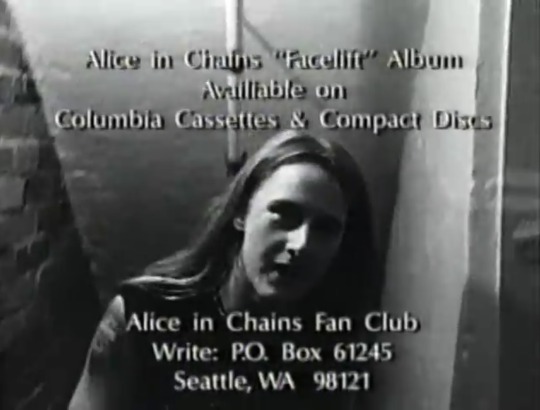
Alice in Chains, Live at the Moore, 1990
oh my godddddddd
#music#alice in chains#aic#layne staley#jerry cantrell#sean kinney#mike starr#90s#90s music#rock#grunge#Spotify
88 notes
·
View notes
Text
just saw assassins at my local community theatre!!! and i thought my fellow assassins fans would like to hear about it bc it was genuinely wonderful.
before the show started there was a medley of classic american showtunes about optimism and dreams playing somewhat creepily as everyone came in
the set used strips of draped fabric that looked like they came from a huge american flag to create a simple but effective circus-tent vibe. there were sideshow style posters up for things like "DEAD PRESIDENT FROM THE GRAVE" and "THE ELECTRIC CHAIR LADY!"
the proprietor was impeccably cast. handsome as hell with a big all-american tv show host smile and nothing behind the eyes.
the presidents were represented by the ensemble holding up photos of said presidents, which led to a hilarious moment after unworthy of your love where hinckley is converged upon by a multitude of ronald reagans chanting "there you go again! there you go again!" which incidentally is a scene from my nightmares
some of the standouts in the cast were czolgosz, who delivered the single best version of the bottle monologue i've ever heard, and byck, who was frighteningly believable and intense. guiteau was also very funny with impeccable comic timing and delivery
the balladeer can only be described as an elderly butch lesbian dressed as a cowboy. she was delightful and had a gorgeous powerful voice, however they only changed the keys of some of the songs for her! half the time she was singing so low it was hardly audible. nonetheless she was great and i want to shake the hand of whoever cast her. and she played her own guitar!!
fromme and moore were hilarious together. i loved them both but i thought the angle that the actress playing squeaky went for resulted in losing some of the vulnerability that makes her character compelling. otherwise they were just a brilliant duo and got the comedic nuances that a lot of other actors miss
the only gripe i really had was with booth, who (although he had the PERFECT voice, genuinely really really impressive) i thought at first was playing it too foppish and goofy to really pull off the gravitas that sells the show in the final sequence. and yet he came through in the end! i was so relieved when he pulled off the book depository scene.
which leads me to their oswald. he brought something i think a lot of actors don't, which is the fact that oswald's a little bit unhinged already. like this guy walked onstage, scrawny and shifty-eyed and nervous, with his ribs literally showing through his t-shirt, and i immediately was able to believe that this is someone so miserable and down on his luck that he's willing to kill for a scrap of attention or admiration. he was so intense and unnervingly hyperactive that it got uncomfortable to watch (which is a good thing in assassins).
i don't know if it was the small space of the theatre or just the fact that i was experiencing it live for the first time, but everything from another national anthem to the end was so emotionally raw and intense that it was overwhelming. i thought that since i know the show so well it would lose the ability to chill me. it didn't. i felt every single moment of that show and it was wonderful.
#bee posts nonsense#assassins musical#theatre#long post#sorry guys lmao#i have more to say later! and this is a threat
42 notes
·
View notes
Text
(1990) Alice in Chains - Love, Hate, Love
Live at Moore Theatre Seattle 1990
#THE VOCALS#layne staley#alice in chains#sean kinney#jerry cantrell#mike starr#mike inez#90s grunge#grunge#music#tumblr#video#live#song#amazing#album#rock#90s#90’s#VOCALS#1990
210 notes
·
View notes
Text
Louise Beavers

Louise Beavers (March 8, 1900 – October 26, 1962) was an American film and television actress who appeared in dozens of films and two hit television shows from the 1920s to 1960. She played a prominent role in advancing the lives of Black Americans through her work and collaborated with fellow advocates to improve the social standing and media image of the Black population.
Beavers was born in Cincinnati, Ohio to school teacher Ernestine (Monroe) Beavers and William M. Beavers, who was originally from Georgia. Her mother's illness caused the family to move to Pasadena, California.
In Pasadena, she attended school and engaged in several after-school activities, such as basketball and church choir. Her mother also worked as a voice teacher and taught her how to sing. In 1920, Beavers graduated from Pasadena High School. She then worked as a dressing-room attendant for a photographer and served as a personal maid to film star Leatrice Joy.
Beavers' acting career began as a member of the Lady Minstrels, a group of young women who staged amateur productions and appeared on stage at the Loews State Theatre. Charles Butler, an agent for African-American actors, saw one of her early performances and recommended that she audition for a film role.
Beavers was initially hesitant to audition for film roles because of the negative portrayal of blacks in film. She once said, "In all the pictures I had seen… they never used colored people for anything except savages." However, she won a role in the film Uncle Tom’s Cabin (1927) and went on to play stereotypical black roles such as those of a slave, a mother figure, a maid or domestic servant. With Claudette Colbert in Imitation of Life (1934)
After playing the role of Julia, the maid and mother figure to a young white woman, in Coquette (1929), Beavers gained more attention for her work and was able to transition to less stereotypical roles. Beavers played Delilah in Imitation of Life (1934), again in the role of a housekeeper, but instead of the usual stereotypical comedic or purely functional role, Delilah's storyline constitutes a secondary parallel plot in which her problems are given considerable emotional gravity. Some in the media recognized the unfairness of Hollywood's double standard regarding race. A contributor to California Graphic Magazine wrote: "the Academy could not recognize Miss Beavers. She is black!"
In 1936, Beavers married Robert Clark, who later became her manager. Beavers and Clark later divorced.
Beavers played the lead role in the film Reform School (1939), once thought to be a lost film, as a forward-thinking probation officer who becomes the superintendent of a reform school and implements major changes.
In the film Holiday Inn (1942), Beavers performed a song during a minstrel show number celebrating Abraham Lincoln's birthday. Because the number features Bing Crosby and others in blackface, some consider it racially offensive and it is often excised from television screenings of the film. Lobby card for the Million Dollar Productions film Life Goes On with "Harry M. Popkin Presents Louise Beavers" logo inset
As Beavers' career grew, some criticized her for the roles that she accepted, alleging that such roles institutionalized the view that blacks were subservient to whites. Beavers dismissed the criticism, acknowledging the limited opportunities available but saying: "I am only playing the parts. I don't live them." As she became more widely known, Beavers began to speak against Hollywood's portrayal and treatment of African Americans, both during production and after promoting the films. Beavers became active in public life, seeking to help support African Americans. She endorsed Robert S. Abbott, the editor of The Chicago Defender, who fought for African-Americans' civil rights. She supported Richard Nixon, who she believed would help black Americans in the struggle for civil rights.
In 1952, Beavers married Leroy Moore, with whom she remained until her death in 1962. She had no children.
In later life, Beavers was plagued by health issues, including diabetes. She died on October 26, 1962 at the age of 62, following a heart attack, at Cedars of Lebanon Hospital in Los Angeles.
Beavers was inducted into the Black Filmmakers Hall of Fame in 1976. She was an honorary member of the Sigma Gamma Rho sorority, one of the four African-American sororities
25 notes
·
View notes
Text
Hannah leading the TED LASSO pack.
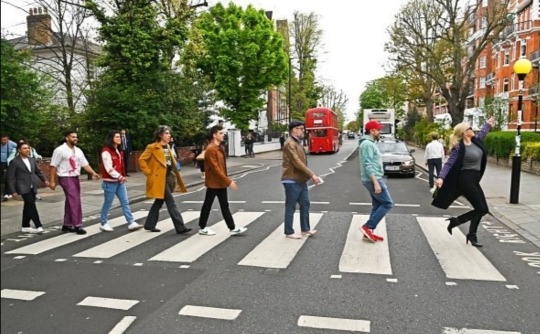

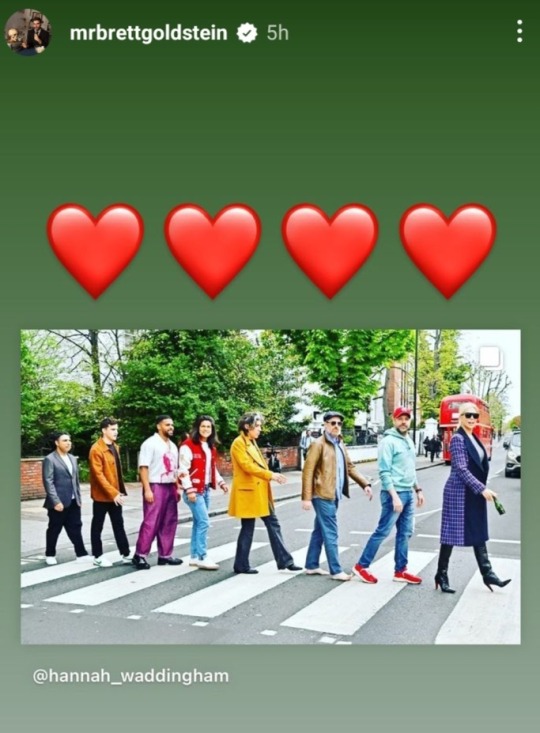
Doing tourist tings.
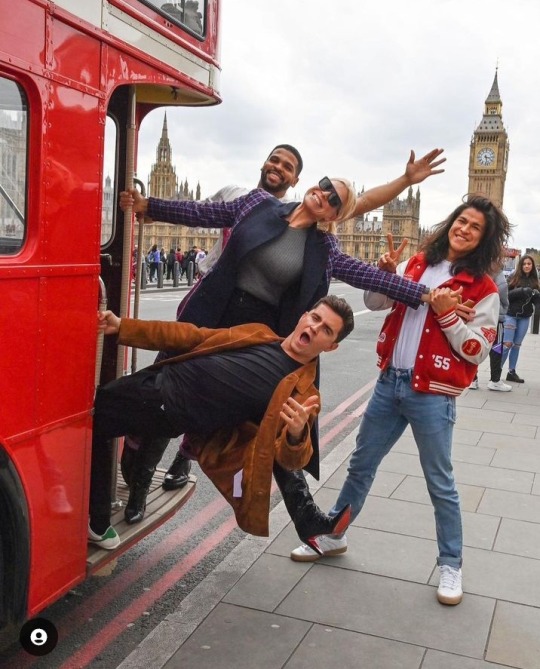
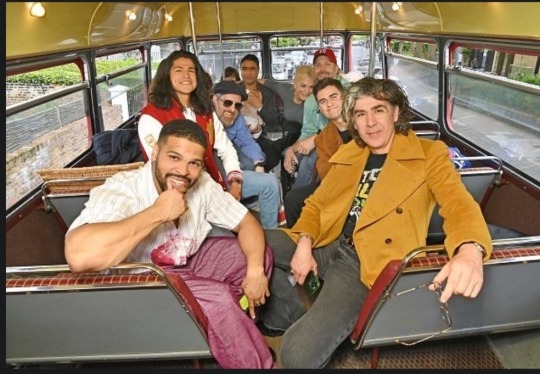
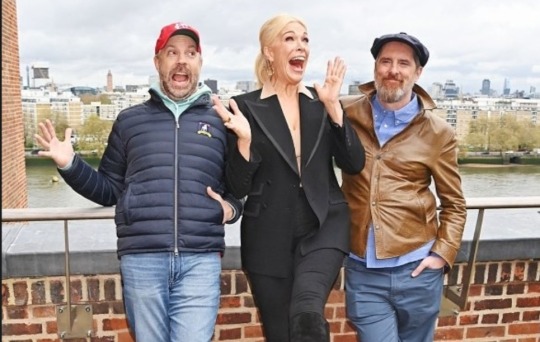




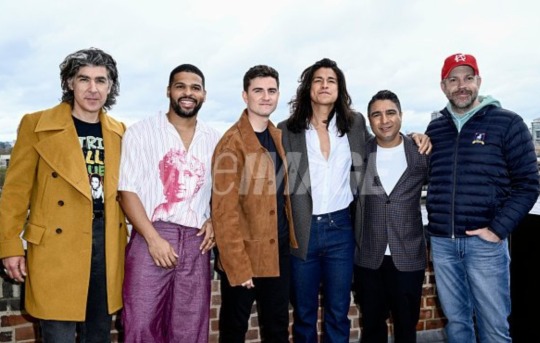
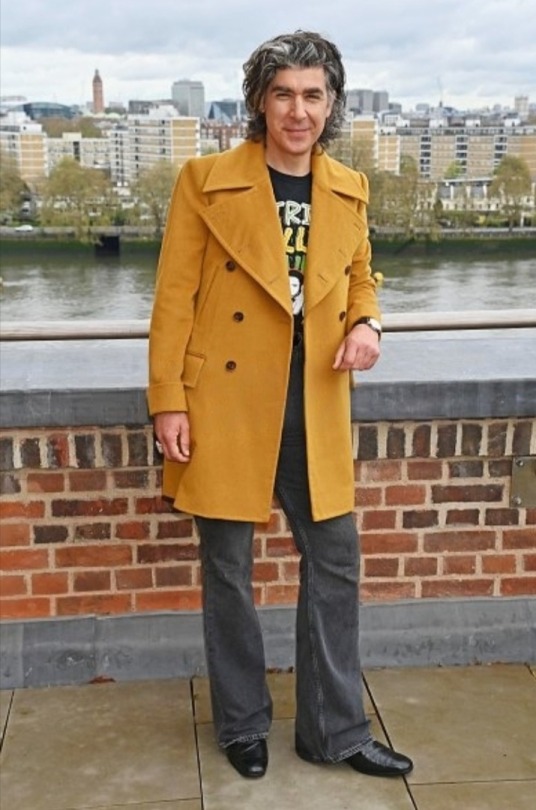
"We saw you from across the bar and we like your vibe.."
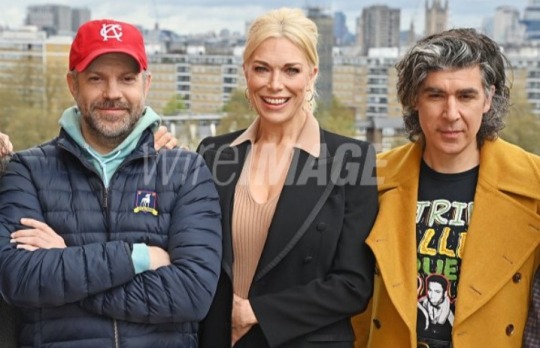
With TED LASSO ending (and it is ending. I don't care about all the hedging that still persists about, "We told *this* story", the show's done. They need to hush their butts with that) it's time to look towards the future. What is on the horizon for AFC Richmond.
The cast next gigs...Oooh whee, what's up with that? What's. Up.With.That?
-Jason Sudeikis will appear in Charlie Day's directorial debut FOOL'S PARADISE.
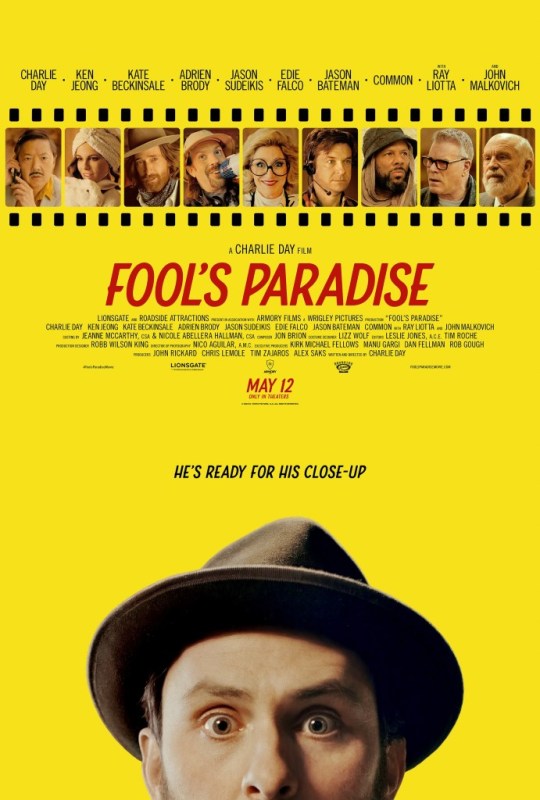
-Hannah Waddingham: Will co-host Eurovision next month, appears in the four part Masterpiece mini TOM JONES

, will appear in THE FALL GUY with Ryan Gosling, MISSION IMPOSSIBLE: DEAD RECKONING Part 2, will have a Christmas special and will do voicework in Dan Harmon's animated series for Fox KRAPOPOLIS (alongside Matt Berry and Richard Ayoade) and voicework in 2024's animated film GARFIELD with Chris Pratt voicing the titular lasagne loving cat.
-Brett Goldstein: Brett will also do voice work for GARFIELD. He's also currently writing series two of Apple+'s SHRINKING
-Toheeb Jimoh can be currently seen on POWER on Amazon Prime. He's currently in rehearsals for his return to the stage in ROMEO AND JULIET for the Almedia Theatre.

-Nick Mohammed: Unsure whether the series that he created/writes and stars in INTELLIGENCE will be renewed as a series or as a wrap-up film, Nick has other works going. He costars in MAGGIE MOORES directed by John Slattery (MAD MEN) and stars Tina Fey and Jon Hamm; he will do voicework in the sequel to CHICKEN RUN titled CHICKEN RUN: DAWN OF THE NUGGET and he has a role in the upcoming Disney+ historical series THE BALLAD OF RENEGADE NELL which will star Alice Kremelberg (ORANGE IS THE NEW BLACK), Frank Dillane, Joely Richardson and Craig Parkinson.
-Jeremy Swift: Will do voice work in the animated cat caper 10 LIVES joining Bill Nighy, Sophie Okonedo and Simone Ashley. Jeremy also joins the Disney Descendants universe for the musical DESCENDANTS: THE RISE OF RED. He currently has a cd out.
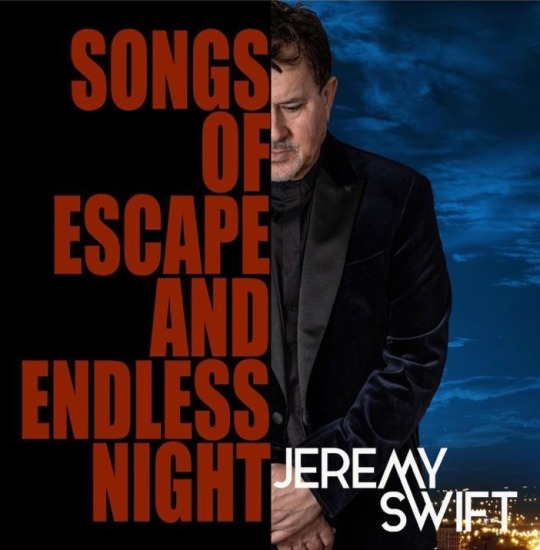
-Phil Dunster: Phil is sticking around Apple TV+ for the time being as he joined series two of their drama SURFACE which stars Gugu Mbatha-Raw (the first season saw her opposite Oliver Jackson-Cohen).
-Juno Temple: Juno was already in the DC universe with a role in THE DARK KNIGHT RISES, but now she joins Brett and Cristo in the Marvel world with a role in the upcoming VENOM 3. She also has a role in the upcoming EVEREST about George Mallory's attempt at scaling the mountain. It will star Ewan McGregor, Sam Heughan and Mark Strong. However, before all that, expect to see her in series 5 of FARGO.
-Cristo Fernandez is a jobbing actor. You will hear him in TRANSFORMERS: RISE OF THE BEAST as Wheeljack
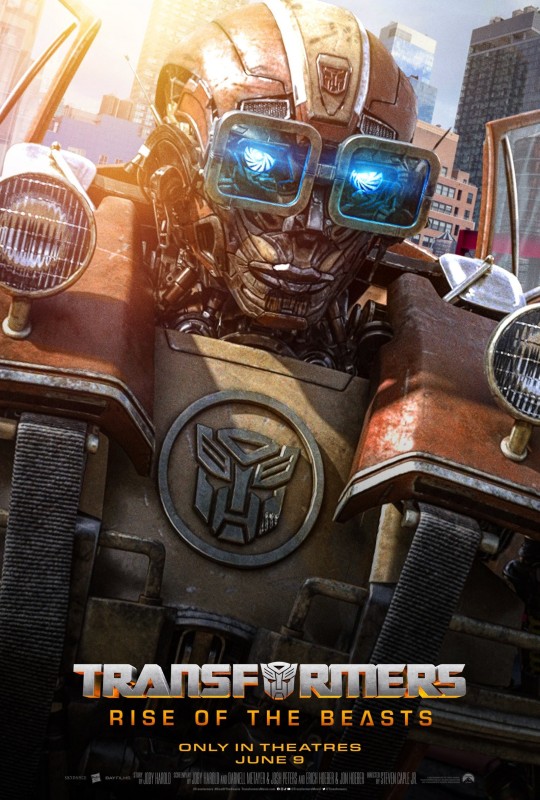
he will do voicework in SCOOB! HOLIDAY HAUNT, he appears in four shorts, the feature 3 FLOWERS and it was just announced that he's joining series 3 of Apple TV+'s ACAPULCO and the Disney+ adaptation of ALEXANDER AND THE TERRIBLE, HORRIBLE, NO GOOD, VERY BAD DAY.
-Moe Jeudy-Lamour (Thierry Zoreaux Van Damme) will costar in the sequel to cousins Stephen and Robbie Amell's film CODE 8. It will be released on Netflix.
New Village People has dropped.

-Moe Hashim: Moe will costar in Roland Emmerich's gladiator series THOSE ABOUT TO DIE.
-Charlie Hiscock: Will appear in Yorgos Lanthimos' POOR THINGS alongside Margaret Qualley, Emma Stone, Willem Dafoe and Mark Ruffalo.

-Sarah Niles: Will turn up in the long gestating reboot of THE TOXIC AVENGER starring Peter Dinklage, Jane Levy, Elijah Wood, Kevin Bacon and Jacob Tremblay. She can currently be seen in ITVX's RICHES.

-James Lance: Always one for voicework, James has lent his talent to the short HANGING which is the writer debut of background Greyhound Joe Street (far right).

#ted lasso#ted lasso cast#jason sudeikis#hannah waddingham#toheeb jimoh#james lance#cristo fernández#brett goldstein#phil dunster#jeremy swift#moe hashim#sarah niles#juno temple#moe Jeudy-Lamour
93 notes
·
View notes
Text
My journey is all mapped out: a two-week Dracula tour of Europe

A fun fact about me is that I enjoy planning holidays that I have no intention of taking. So, if I had two free weeks and more money than I actually do, here's the Dracula-inspired journey around Europe that I might consider.
(Spoilers under the cut)
Days 1-3: Whitby

This is the opportunity to visit all the key Dracula locations, from a coastal walk to Robin Hood's Bay to gazing out over the village and the sea from Mina and Lucy's favourite spot in the graveyard of St Mary's.
In non-Dracula things, Whitby Goth Weekend happens twice a year in April and October. I recommend the Magpie Café for fish and chips.
Day 4: travel to London

Most of the long train journeys in this plan are delightful overnight sleeper services that will make you feel like you're right there with Jonathan and Mina rattling across Europe. Unfortunately, the journey from Whitby to London is not one of them.
Services are infrequent and the journey takes a solid 5 hours. But the start, where you go very very slowly through the beautiful North York Moors, isn't too bad.
Days 5-7: London

There's a whole heap of things to see in London on a theme by either Dracula or Bram Stoker:
The Lyceum Theatre, where Bram Stoker worked for 27 years
The various houses that Bram Stoker lived in
Golders Green Crematorium, where Bram Stoker's ashes can be visited by appointment
Assorted Dracula settings, such as those the Harkers visited on their London day trip
I'd also suggest a visit to Highgate Cemetery, which may have been part of the inspiration for Lucy's tomb (pop in on Karl Marx and Douglas Adams while you're there), and the British Library for general literary joy.
Exeter is a 2.5 hour train journey from London, so you could also go there, either overnight or for a speedy day-trip, if you're a completist. But personally I'd skip it and spend the time going to see the Lion King at the Lyceum or a Shakespeare play at the Globe instead.
Day 8: Paris

The characters in Dracula take a number of different routes to get across Europe, but I've gone with the route that the Crew of Light take as they go to hunt Dracula down in his home.
That means following the Man in Seat 61 guide for travelling from London to Romania by train, taking an early Eurostar to get yourself to Paris. You'll only have a few hours in Paris before the evening sleeper train, but it should be enough to visit Père Lachaise Cemetery, where Oscar Wilde is buried.
Day 9: Vienna

You'll arrive in Vienna around 10am, then have the day to spend there until another evening train. Personally, I'd spend the time visiting the Hofburg Palace and Sisi Museum; Empress Elisabeth (Sisi) of Austria was famous in the late 19th century and her tragic life story feels fitting for a Dracula tour.
Yes, this plan involves fast trains crossing multiple European countries without much of a breather. Just like they do in Dracula :)
Day 10: Cluj-Napoca

Note: I've visited all the other destinations in this guide, but never been to Romania, though I'd really like to go to Cluj in particular. So from this point on, this is based on googling, not first-hand knowledge.
Cluj, referred to by the German name of Klausenburg in Dracula, is the unofficial capital of Transylvania. Your sleeper train from Vienna should get there around 8.20am, in time to hop on a tram to the Old Town's cluster of breakfast places. I've been told that Cluj is a lively, student-y city with great nightlife and festivals.
Days 11-14: Romania

Time to explore Romania! At this point there's a decision to make. On the one hand, there's strict adherence to the settings of Dracula, in which case you'll want to head to Bistrița, or maybe even extend your journey on to Varna or Galați.
On the other hand, you could go more on vibes. In which case, hire a car to drive through the remoter parts of Transylvania, then turn south to Bran Castle, which has very little actual connection to Dracula but certainly looks the part.
-------
In the unlikely event that anyone actually does this journey off the back of this post, please let me know how it goes. I'd be so thrilled to hear about it!
44 notes
·
View notes
Note
You know, when I moved to the UK, I hated the city I live in (still not a fan) and of the ones I've visited, I thought York was my favourite. But after I visited Whitby in 2019, I just fell in love. I was walking towards the Abbey and they were doing a theatre of a few scenes from Dracula and I was like???? Vampires???? I never read Dracula so I didn't know about Whitby! It was such a nice surprise to me though! And I could stare at that stupid cliff with the abbey on top for HOURS and not get sick of it!
And I went to the goth weekend on Saturday, and it was so much fun! I think I might go again in April!
I've never been to the goth weekend, but Whitby is a special place, and York too. I've only been to York once, but loved it. I hope you've found some other places here in the UK to balance out not enjoying where you currently live. If you ever want recommendations for the south at least, I can offer a few, but other than that, I've been to the Lake District, Forest of Bowland, Yorkshire Dales and Moors, and some of Wales :). Forest of Dean is on my major list - particularly Puzzlewood
27 notes
·
View notes
Text
Vanitas Headcanons
General Headcanons that have no relevancy at all but I brainrot these on a daily basis.
If you see typos— no you didn't
TW: mentions of death and some Lightly-angsty Headcanons!
EDIT: I spelt so many things wrong WHOOPS I swear I know how to english
✎... VANITAS
⌛ Vanitas has itty bitty freckles all over his face, they weren't very noticeable but they're there
⌛ He is very good at knife juggling and lives for the thrill of it
⌛ Because I live for the Trans!Vanitas Headcanons and fancy ass scars; his scars oddly look like little wonky hour glasses
⌛ if Vanitas were to be in a relationship I feel like he isn't much of a PDA person; so he gets all funny when he's genuinely being shown affection in front of people.
⌛ for the Vanoè shippers and piggyback from the PDA Headcanons; I feel like Vanitas loves to just sit on the roof; he won't go out if his way to cuddle Noè or anything, but enjoys his company
⌛ for the VaniJeanne shippers; listen. Vanitas will let Jeanne do his makeup.
⌛ In a Modern-Day setting, in terms of music, I feel like Vanitas would like MCR; but also REALLY likes The Oozes
⌛ Vanitas is a musical guy because he just- radiates theatre kid. He likes the Falsettos :D
✎... NOÈ
🐱 I like to think Noè used to have a speech impediment when he was younger
🐱 Boi stims and likely has ADHD.
🐱 When he stims; he usually waves his hands around, shakes Vanitas or stomp in place
🐱 He can repeat "uhm uhm uhm uhm" for a minute straight until he remembers what he is thinking; and it pisses everyone (But Domi) off
🐱 for the Vanoè shippers, but I'm throwing in some angst. While Noè crushes on Vanitas (before a relationship), I feel like Noè tends to stare at Vanitas while on the rooftop and internally recites thousands of poems, but never speaks them.
🐱 When Noè gets Into a relationship with Vanitas, He leaves small pieces of the poems he's written around their room for Vanitas to find
🐱 For the DomiNoè shippers, I feel like Noè gives her the BEST hugs and cuddles you've EVER seen and is like her backpack
🐱 When Noè is in a relationship bc why tf not; you bet your ass he traces over ALL of his partners scars
🐱 Did I say I'm a Vanoè shipper? Well— more angst. In the end when Noè marks Vanitas, they come to a mutual understanding; but they embrace eachother for the last memory :) I can't think of anything sadder than that so that's for the softies (aka me)
🐱 Noè is a book dragon; he reads when he suddenly gets the motivation but he loves to hoard books because he thinks hell read them but never does
✎... JEANNE
🌹 She loves roses; she feels like a rose girl
🌹 In modern times; She's also a theatre kid- but she loves all the niche musicals.
🌹 her favorite singer is Aurora :) and she LOVES Tomm Moore movies
🌹for the VaniJeanne shippers, She loves to braid his hair and get him all pampered up
🌹 She gets sunburned very easily
🌹She's very sensitive to STRONG aroumas so she likes the subtlety
🌹Jeanne daydreams a lot when she has absolutely nothing to do
🌹(VaniJeanne) When Jeanne is in a relationship with Vanitas; she definitely makes sure to take care of him and is constantly checking up on him and giving him constant reminders that she does indeed love him
🌹Her love language is probably Words of Admiration and Physical touch
🌹She stims as well but they're usually little whistles and fiddling with sensory objects; these only happen when she's anxious and flustered
🌹For the DomiJeanne shippers; Jeanne loves to do Domi's first date was at a greenhouse then a Cafe.
🌹 Again for the DomiJeanne Shippers; Jeanne is the big spoon.
🌹 Jeanne would play DnD and always plays either the little and chaotic menaces or the big and gentle cutie patooties
✎... DOMINIQUE
I had a bunch of things for Domi but I had a blank while writing these
🗡 Bc I am; Domi is near sighted. It isn't TOO bad but it certainly is annoying
🗡 Domi is a secret bookworm and finds it so relaxing to read with a nice cup of tea
🗡 Domi used to take fencing classes and was really good? Listen girlie wields a sick rapier she DEFINITELY had practice ((this isn't even a Headcanon tbh))
🗡 Domi used to use Noè for practice
🗡 Domi doesn't like putting her hair up but is okay with doing braids or other types of hairstyles
🗡 Domi has a birthmark that looks to have matched Louis's :)
🗡 Domi, in Modern, would ALSO play DnD but dm's for Jeanne
🗡 Domi loves PDA :) romantic or platonic
🗡 I like to think Noè is her soulmate, both in a romantic and platonic sense
#the case study of vanitas#vanitas#noe archiviste#jeanne#dominique de sade#vnc#vnc vanitas#vanitas no carte#headcanon#theyre so silly#vanoe#vanijeanne#domijeanne#what is the ship name for domi and noe? do they even have one?#sobs
26 notes
·
View notes
Text
'Andrew Scott’s success did not arrive overnight. His has been a slow and steady ascent from supporting player to leading man. But his status is now assured: at 47, the Irishman is among the most talented and prominent actors of his generation, on stage and screen.
Dublin-born and raised, Scott first took drama classes at the suggestion of his mother, an art teacher, to try to overcome a childhood lisp. At 17 he won his first part in a film, Korea (1995), about an Irish boy who finds himself fighting in the Korean War. By 21, he was winning awards for his performance in Eugene O’Neill’s Long Day’s Journey into Night, for director Karel Reisz, no less, at The Gate. He arrived in London, where he continues to live, at the end of the 1990s, and worked regularly, with smaller parts in bigger TV shows (Band of Brothers, Longitude) and bigger parts in smaller plays (A Girl in a Car With a Man, Dying City). By the mid-2000s he was well established, especially in the theatre. In 2006, on Broadway, he was Julianne Moore’s lover, and Bill Nighy’s son, in David Hare’s Iraq War drama, The Vertical Hour, directed by Sam Mendes. In 2009, he was Ben Whishaw’s betrayed boyfriend in Mike Bartlett’s Cock, at the Royal Court. He won excellent notices for these and other performances, but he was not yet a star. If you knew, you knew. If you didn’t know, you didn’t know. Most of us didn’t know; not yet.
That changed in 2010 when, at the age of 33, he played Jim Moriarty, arch nemesis of Benedict Cumberbatch’s egocentric detective, in the BBC’s smash hit Sherlock. The appearance many remember best is his incendiary debut, in an episode called “The Great Game”. When first we meet him, Moriarty is disguised as a creepy IT geek, a human flinch with an ingratiating smile. It’s an act so convincing that even Sherlock doesn’t catch on. Next time we see him, he’s a dapper psychotic in a Westwood suit, with an uncannily pitched singsong delivery and an air of casual menace that flips, suddenly, into rage so consuming he’s close to tears. Such was the relish with which Scott played the villain — he won a Bafta for it — that he risked the black hat becoming stuck to his head. In Spectre (2015), the fourth of Daniel Craig’s Bond movies, and the second directed by Sam Mendes, Scott played Max Denbigh, or C, a smug Whitehall mandarin who wants to merge MI5 and MI6, sacrilegiously replacing the 00 agents with drones. (If only.)
There were other decent roles in movies and TV series, as well as substantial achievements on stage, and he might have carried on in this way for who knows how long, even for his whole career, as a fêted stage performer who never quite breaks through as a leading man on screen.
But Scott had more to offer than flashy baddies and scene-stealing cameos. His Hamlet, at The Almeida in London, in 2017, was rapturously received. I’ve seen it only on YouTube, but even watching on that degraded format, you can appreciate the fuss. Scott is magnetic: funny, compelling, and so adept with the language that, while you never forget he’s speaking some of the most profound and beautiful verse ever written, it feels as conversational as pub chat.
Another banner year was 2019: a memorable cameo in 1917 (Mendes again) as a laconic English lieutenant; an Emmy nomination for his performance in an episode of Black Mirror; and the matinée idol in Noel Coward’s Present Laughter at London’s Old Vic, for which he won the Olivier for Best Actor, the most prestigious award in British theatre.
The second series of Phoebe Waller-Bridge’s phenomenal Fleabag, also in 2019, proved to a wider public what theatregoers already knew: Scott could play the mainstream romantic lead, and then some. His character was unnamed. The credits read, simply, “The Priest”. But social media and the newspapers interpolated an adjective and Scott became The Hot Priest, Fleabag’s unlucky-in-love interest, a heavy-drinking heartbreaker in a winningly spiffy cassock, and an internet sensation.
Fleabag began as a spiky dramedy about a traumatised young woman. Scott’s storyline saw it develop into a bittersweet rom-com, brimming with compassion for its two clever, funny, horny, lonely, awkward, baggage-carrying heroes, lovers who can’t get together because, for all the snogging in the confessional, one of them is already taken, in this case by God.
It was the best and brightest British comedy of the 2010s, and Scott’s fizzing chemistry with Waller-Bridge had much to do with that. The ending, when she confesses her feelings at a bus stop, is already a classic. “I love you,” she tells him. “It’ll pass,” he says.
Over the past 12 months, in particular, Scott has piled triumph on top of victory, and his star has risen still further. At the National, last year, he executed a coup de théâtre in Vanya, for which he was again nominated for an Olivier. (He lost out to an old Sherlock sparring partner, Mark Gatiss, for his superb turn in The Motive and the Cue, about the making of an earlier Hamlet.) For Simon Stephens’s reworking of Chekhov’s play, Scott was the only actor on stage. On a sparsely furnished set, in modern dress — actually his own clothes: a turquoise short sleeve shirt, pleated chinos, Reebok Classics and a thin gold chain — and with only very slight modulations of his voice and movements, he successfully embodied eight separate people including an ageing professor and his glamorous young wife; an alcoholic doctor and the woman who loves him; and Vanya himself, the hangdog estate manager. He argued with himself, flirted with himself and even, in one indelible moment, had it off with himself.
It’s the kind of thing that could have been indulgent showboating, a drama-school exercise taken too far, more fun for the performer than the audience. But Scott carried it off with brio. In the simplest terms, he can play two people wrestling over a bottle of vodka in the middle of the night — and make you forget that there’s only one of him, and he’s an Irish actor, not a provincial Russian(s). An astonishing feat.
For his next trick: All of Us Strangers, among the very best films released in 2023. Writer-director Andrew Haigh’s ghost story is about Adam (Scott), a lonely writer, isolated in a Ballardian west-London high-rise, who returns to his suburban childhood home to find that his parents — killed in a car crash when he was 11 — are still living there, apparently unaltered since 1987. Meanwhile, Adam begins a tentative romance with a neighbour, Henry (Paul Mescal), a younger man, also lonely, also vulnerable, also cut off from family and friends.
Tender, lyrical, sentimental, sad, strange, and ultimately quite devastating, All of Us Strangers was another potential artistic banana skin. At one point, Scott’s character climbs into bed with his parents and lies between them, as a child might, seeking comfort. In less accomplished hands, this sort of thing could have been exasperating and embarrassing. But Scott’s performance grounds the film. He is exceptionally moving in it. He was nominated for a Golden Globe for Best Actor, losing to his fellow Irishman, Cillian Murphy, for Oppenheimer. Earlier this year, he made history as the first person to receive Critics Circle awards in the same year for Best Actor in a film (All of Us Strangers) and a play (Vanya).
Finally, last month, the title role in Ripley, a new spin on the lurid Patricia Highsmith novels. That show, which unspools over eight episodes on Netflix, was a long time coming. Announced in 2019, it was filmed during the pandemic, at locations across Italy and in New York. Scott is in almost every scene and delivers an immensely subtle and nuanced portrayal of Highsmith’s identity thief, a character previously played by actors including Alain Delon, Dennis Hopper, and Matt Damon in the famous Anthony Minghella film The Talented Mr Ripley, from 1999.
The fragile almost-charm that makes Tom Ripley such an enduring antihero is there in Scott’s portrayal, but so is the creepiness, the isolation, the fear and desperation. His Ripley can turn on a smile, but it quickly curdles. Filmed in high-contrast black and white, Ripley is a sombre, chilly work by design, but doggedly compelling, and not without a mordant wit. Again, critics swooned.
So the actor is on a hot streak. Later this year he’ll appear in Back in Action, a Hollywood spy caper, alongside Cameron Diaz and Jamie Foxx, above-the-title stars with dazzling, wide-screen smiles. But could they play Chekhov single-handed? They’ll need to be on their toes.
Before our shoot and subsequent interview, in April, I had met Scott briefly on two previous occasions, both times at fancy dinners for fashion brands. Compact, stylish, dynamic, he is impishly witty and charismatic: good in a room. Also, obliging: the second time I met him, he took my phone and spoke into it in his most diabolical Moriarty voice for a wickedly funny voice message to my son, a Sherlock fan.
At the Esquire shoot, on an overcast day in south London, Scott again demonstrated his good sportiness: dancing in the drizzle in a Gucci suit; generously sharing his moment in the spotlight with an unexpected co-star, a local cat who sauntered on to the set and decided to stick around for the close-ups; and entertaining the crew — and hangers-on, including me — with rude jokes. At one point, while for some reason discussing the contents of our respective fridges, I asked him where he kept his tomatoes. “Easy, Tiger,” he said.
At lunch the following day, upstairs at Quo Vadis, the restaurant and members’ club in Soho (my suggestion), the actor arrived promptly, settled himself on a banquette, and we got straight to business. It’s standard practice now for interviews published in the Q&A format to include a disclaimer, in the American style: “This conversation has been edited for length and clarity.” (Well, duh.) In this case, we talked for close to three hours. Inevitably, paper costs being what they are, and Esquire readers having busy lives, some of that verbiage has ended up on the cutting-room floor. But not much! I’ve tried to let it flow as much as possible, and to keep the spirit of the thing, in which we toggled, like all good performances, between light and dark, comedy and tragedy.
In early March, a month before this interview took place, Scott and his family suffered a terrible and unexpected loss: his mother, Nora, suddenly died. He went home to Dublin to be with his dad, Jim, his sisters, Sarah and Hannah, and their family and friends.
As an interviewee and, I suspect, as a person, Scott is thoughtful, convivial and solicitous: he doesn’t just answer questions, he also asks them. He is not above the occasional forearm squeeze when he wants to emphasise a point. He seems to possess a sharp emotional intelligence. Perhaps one should expect empathy in a great actor, but in him it seems particularly marked.
Before we began talking, there was some studying of the menu. Scott wondered, since I eat often at Quo Vadis, if I had any recommendations. I told him I had my eye on the pie: chicken, ham and leek. “Why would you not have the pie?” wondered Scott. A good question.
So, how was your morning? Where have you come from?
This morning I’ve been at the gym, Alex.
Are you working out for a specific reason or are you just a healthy man?
Just trying to keep it going. Exercise is so helpful to me. I don’t know if you know, but my mum died four weeks ago.
I did know, and I’m so sorry.
Thank you. So, yeah. Just trying to keep it going. They say your body feels it as much as your mind.
The grief?
Yeah, the grief. My friend said a brilliant thing last night. She’s been through grief. She said, if you think of it like weights, the weight of it doesn’t decrease, but your ability to lift the weights does. So, if you go to the gym and you’re completely unpractised you won’t be able to lift the weight. But the more you get used to it, the more you can lift. There’s a slight analogy to grief. I’m just learning about it.
Have you been through grief before?
Not really. A little bit, but not to this extent. And it’s a strange thing because, obviously, I’m in the middle of having to talk a lot [promoting Ripley] and making that decision of whether to talk about it or whether not to talk about it. I’m finding myself talking about it, because it’s what’s going on, and without giving away too much of it she was such an important figure. It feels right. It’s such a natural thing.
Is it helpful to talk about it?
I think it has to be. I feel very lucky with my job, in the sense that, all those more complex, difficult feelings, that’s what you have to do in a rehearsal room; you have to explore these things. So strange: a lot of the recent work that I’ve done has been exploring grief. With Vanya, and All of Us Strangers. So it’s odd to be experiencing it this time for real.
I wasn’t planning on making that the focal point of this piece, so it’s up to you how much you feel comfortable talking about it.
I appreciate that.
Was it unexpected? Did it happen out of the blue?
Yes. She was very alive four weeks ago. She just deteriorated very quickly. She got pneumonia and she just… it was all over within 24 hours.
What sort of person was she?
She was the most enormously fun person that you could possibly imagine. Insanely fun and very, very creative. She’s the person who sort of introduced me to acting and art. She taught me to draw and paint when I was really young —that’s another big passion of mine, drawing and painting. She was amazing with all of us. My sister Sarah is very talented in sport, she’s now a sports coach. And my sister Hannah was very artistic and she’s an actor now. So, she was really good at supporting us throughout all our different interests. What I say is that we’ve been left a huge fortune by her. Not financially, but an emotional fortune, if you know what I mean? I feel that really strongly. And once this horrible shock is over, I just have to figure out how I’m going to spend it. Because I think when someone else is alive and they’ve got amazing attributes, they look after those attributes. And then when they die, particularly if they are your parent, you feel like you want to inhabit them, these incredible enthusiasts for life. She just made connections with people very easily. I feel enormously grateful to have had her. Have you had much grief in your life?
My mother died, during Covid. She had been ill for a long time, so it was a very different experience to yours. But I think they are all different experiences, for each of us. I don’t know if that loss would be in any way analogous to yours. But like you, I love art and books and music, and that’s all from her. Last night, I watched a rom-com with my daughter, who is 14. And I don’t know if I would like rom-coms so much, if it wasn’t for my mum.
Love a rom-com! What did you watch?
Annie Hall.
Did she like it, your daughter?
She absolutely loved it. She was properly laughing.
Oh, that’s great!
And she’s a tough one to impress. But she loved it, and my mum loved Woody Allen. My mum can’t recommend Woody Allen to my daughter now, but I can, and that’s come down from her. So it goes on.
That’s what I mean. Your spirit doesn’t die. And I’m sure you went to bed going, “Yes!”
I did! It was a lovely evening, it really was. Tonight we’ll watch something else.
Are you going to watch another Woody Allen? Which one are you going to watch?
I thought maybe we’d watch Manhattan? More Diane Keaton.
Or Hannah and Her Sisters? That’s a good one. Insanely good. Yeah, it’s amazing that legacy, what you’re left with. My mum was so good at connecting with people. She was not very good at small talk. She was quite socially bold. She would say things to people. If she thought you looked well, she’d tell you. She’d always come home with some story about some pot thrower she met at some sort of craft fair. Being socially bold, there’s a sort of kindness in it. When someone says something surprising, it’s completely delightful. My mother sent me something when I was going through a bad time in my twenties. It was just a little card. It said, “The greatest failure is not to delight.” What a beautiful quote. And she was just delighted by so many things, and she was also delightful. And like her, I really love people. I really get a kick out of people.
I can tell.
But there’s a kind of thing, if you become recognisable, people become the enemy? And it’s something I have to try and weigh up a little bit. Because people are my favourite thing about the world. I think it’s part of my nature. My dad is pretty sociable too. And so it’s weighing that up, how you keep that going. Because certain parts of that are out of your control: people treat you slightly differently. But this phase, the past four weeks, it still feels so new. Just thinking about legacy and kindness and love and the finite-ness of life. All that stuff.
Big stuff.
Yeah, it’s big stuff. And it’s very interesting, talking about grief. Because it’s not all just low-energy sadness. There’s something galvanising about it as well. I don’t know if you found that, too?
One of the things about someone else dying is it makes you feel alive.
Yes, exactly. Even though we have no choice, it does that. It’s that amazing thing, the year of magical thinking.
[Waiter approaches. Are we ready to order?]
We are.
I think so. Are we two pie guys?
We’re two pie guys!
We’re pretty fly for pie guys.
Are we salad guys? Tomato, fennel and cucumber salad?
Yeah.
And chips, maybe?
Listen, you only live once.
So, the year of magical thinking…
You know, when you’re walking along, are you allowed to have a surge of joy? Or are you allowed to just stay home and… It’s extraordinary when it gets you.
Like a wave of emotion?
I had one on the rowing machine today. I’m glad of it, though.
That was sadness.
Just loss, yeah. Just loss.
So, there’s two ways to do this. You can choose. We can do the usual interview where we start at the beginning with your childhood and go all the way through to now. That’s totally fine. Or, I can throw more random questions at you, and see where that takes us?
Random!
Shall we random it?
Let’s random it.
OK. That means I might sometimes read questions off this piece of paper.
Reading takes just slightly away from the randomness of it, Alex…
That is a very good point. You are quite right. But I don’t read them out in order! They’re just prompts.
[Sardonically] Oh, I see!
Talk me through what you’re wearing.
Oh, this is so old. What does it say?
[I peer at the label on the inside of his shirt collar. It says Hartford.]
What colour would you call that?
I’d call it a bit of a duck egg, Alex, would you?
I’d go with that. And it’s like a…
Like a Henley?
And these [pointing to trousers]?
Mr P trousers. And a pair of old Nikes.
And sports socks.
When I am off duty, I think I dress slightly like an 11-year-old. You know, when you’re just plodding the streets, I wear, like, a hoodie and trainers.
And you have a chain round your neck.
This is a chain that I bought in New York. No, maybe I bought it in Italy. It was a replacement chain. I’ve worn a chain for years. Sometimes I like to have it as a reminder that I’m not working. When you’re in character, you take it off. Because when you’re in a show or a play, they sort of own you. They own your hair.
They own your hair!
Or sometimes you have to walk around with, like, a stupid moustache. Or, worse, chops. Actors fucking hate that. Like, nobody suits that, I don’t think. Right? I’m trying to think of someone who suits that.
Daniel Day Lewis, maybe? He can carry it off.
He’s got the chops for chops!
What’s something about you that you think is typically Irish?
It goes back to that people thing. When I go home to Ireland, I’m aware that people talk to each other a lot more. And I think there’s a sense of humour that Irish people have that I love. And I suppose a softness, too, that I love. Those are the positive things. And then the guilt and the shame is the negative stuff.
Catholic guilt?
Catholic guilt. I feel very strongly, though, that I’ve worked to emancipate myself from it. There’s a certain unthinking-ness to guilt. Your first thought, always: “What have I done wrong? It’s gotta be me.” That doesn’t benefit anyone. And with shame, I don’t feel shame anymore. I think I probably did before. But in a way, it’s an irrelevant thing for me to talk about now. The thing I prefer to talk about is how great it is not to have that anymore. Rather than how horrible it was. The thing I feel enthusiastic about is how there are so many beautiful and different ways to live a life that aren’t centred on the very strict, Catholic, cultural idea of what a good life might be. Namely, 2.4 children and certain ideas and a very specific life.
Are there positives to be taken away from a Catholic education?
The rituals around grief, I think, are really beautiful, having gone through what I’ve just been going through. And the community that you get in Catholicism. Because that’s what Catholicism is about, in some ways: devotion to your community. The amount of love and support you get is to be admired. It’s the organisation that has been the problem, not the values. Random question number 16!
When’s the last time you were horrifically drunk?
Good question! I was in New York doing press recently for Ripley. And I met Paul Mescal. He had a negroni waiting for me. Love a negroni. And then we went dancing.
Are you a good dancer?
I’m pretty good, freestyle. Slow on choreography but once I get it, I’m OK. I love dancing.
I love dancing.
Do you really? Do you do, like, choreographed dancing as well?
No! But I’m a good dancer.
Do you have moves?
Oh, I have moves.
Ha! I love that!
It’s so freeing, so liberating.
It totally is.
And it’s sexy and fun.
Exactly! It’ll get you a kiss at the end of the night.
It’s sort of showing off, too, isn’t it?
But it’s also completely communal. It connects you with people. Also, you can learn so much about someone by watching how they connect with people on a dance floor. How much of communication do they say is non-verbal? An enormous amount.
If you didn’t live in London, where would you most like to live?
I suppose Dublin. I do live a wee bit in Dublin. But one of the things I feel really grateful for is that I have sort of been able to live all over the place. I lived in Italy for a year, during the pandemic.
You were making Ripley?
Yeah, we were all over. Rome, Venice, Capri, Naples… A bit of New York. I’d love to spend more time in New York. I was very lucky recently to have my picture taken by Annie Leibovitz. We were outside the Chelsea Hotel, and this woman came up. [Thick Noo Yawk accent, shouting]: “Hey, Annie! Why don’t you take a picture of this dumpster? It’s been outside my block for two months! Take a picture of that!” There’s something about that New York-iness that I love. It still has such romance for me.
How old do you feel?
Really young. I don’t have an exact age for you. Thirties?
Some people feel in touch with their childhood selves, or almost unchanged from adolescence. Others seem to have been born an adult.
That’s really true. I think of playgrounds for children: you’re actively encouraged to play, as a kid. “Go out and play!” And I hate that at some point, maybe in your mid-twenties, someone goes, “Now, don’t play! Now, know everything. Now, turn on the television, acquire a mortgage and tell people what you know.” I have to play for a living. It’s so important, not just in your job, but in life. It’s a great pleasure of life, if you can hold on to that. Talking about my mum again, she had an amazing sense of fun.
She was a funny person? She made people laugh?
Absolutely.
That’s important, isn’t it?
It’s really important. I think having a sense of humour is one of the most important things in life. It’s such a tool. And you can develop it. My family were all funny. Laughter was a currency in our family. Humour is a magic weapon. It separates us from the other species. Like, I love my dog. I think dogs are amazing. And he can have fun, but he’s not able to go, “This is fucking ridiculous.” He’s not able to do that! So it’s a real signifier of your humanity, in some ways.
Also, being a funny person, or someone who can connect with people through humour, that’s how we make friends.
I think actors make really good friends. Because you’re in the empathy game. And because you’re making the decision to go into an industry that is really tough, you need to have your priorities straight: “I know this is tough, I know the chances of me succeeding in it are slim, but I’m going to go in anyway.” It shows a sort of self-possession that I think is a wonderful thing to have in a friend. Also, actors are just funny. And a lot of them are sexy!
Funny and sexy: good combination.
I know! Not that you want all your friends to be sexy, that’s not how you should choose your friends.
Oh, I don’t know. It’s not the worst idea.
It’s not. But I think it’s something to do with empathy. And it’s a troupe mentality as well. You’re good in groups.
It’s a gang.
I love a gang. Do you like a gang?
I do. Magazines are like that. A good magazine is a team, a great magazine is a gang. And the thing we produce is only part of it: you put it out there and people make of it what they will. The process of making it is the thing, for me.
Oh, my God. That’s something I feel more and more. Process is as important as product. I really believe that. You can have an extraordinary product, but if it was an absolute nightmare to make then, ultimately, that’s what you’re going to remember about it. You make good things that are successful that everybody loves? That’s lovely. But also, you make stuff that people don’t respond to. So, if you have a good time in the process, and the attempt is a valiant one, and there’s a good atmosphere, if it’s kind and fun, that’s the stuff you hold on to. One of the reasons I love the theatre is you don’t have to see the product. You just do it, and then it’s done. It’s an art form that is ephemeral. There’s a big liberation, too, in discovering you don’t have to watch any of your films if you don’t want to.
Have you watched Ripley?
I watched Ripley once.
And?
It’s a lot of me in it! Jesus!
Is that a problem?
I find it hard to watch myself. I do. There’s something quite stressful about looking at yourself. Have you ever heard yourself on someone’s answering machine? Horrific! You’re like, “Oh, my God, that can’t be me. How do they let me out in the day?” It’s like that, and then it’s your big, stupid face as well. Mostly, I have a feeling of overwhelming embarrassment.
On a cinema screen, I can’t even imagine. Your face the size of a house!
The size of a house, and there’s 400 people watching you.
Nature did not intend humans to ever experience this.
That is so true. It’s not natural.
I mean, even mirrors are to be avoided.
Maybe looking in the sea is the only natural way?
Well, Narcissus!
Yeah, true. That didn’t turn out well. I’d love for that to be a tagline for a movie, though: “Nature did not intend humans to ever experience this…”
But equally, nature didn’t intend the rest of us to gaze upon you in quite that way. We sit in the dark, staring up worshipfully at this giant image of you projected on a screen for hours. Is that healthy?
Without talking about the purity of theatre again, when you’re in the theatre, you, as the audience, see someone walking on the stage, and technically you could go up there, too. There’s not that remove. It’s live. There’s a real intimacy. That’s why I feel it’s the real actor’s medium. Your job is to create an atmosphere. I always find it insanely moving, even still, that adults go into the dark and say, “I know this is fake, but I don’t care: tell me a story.” And they gasp, and they cry, or they’re rolling around the aisles laughing. It’s so extraordinary, so wonderful that it exists. I really do believe in the arts as a human need. I believe in it so deeply. During the pandemic, our first question to each other was, “What are you watching? What book are you reading?” Just to get through it, to survive. It’s not just some sort of frivolous thing. It’s a necessity. As human beings, we tell stories. Expert storytellers are really vital. No, it’s not brain surgery. But, “Hearts starve as well as bodies. Give us bread, but give us roses.” I love that quote.
Tell me about playing Hamlet. Was it what you expected it would be?
It’s extraordinary. Loads of different reasons why. From an acting point of view, there’s no part of you that isn’t being used. So you have to, first of all, have enormous physical stamina, because it’s nearly four hours long. Our version was three hours, 50 minutes. And you have to be a comedian, you have to be a soldier, you have to be a prince, you have to be the romantic hero, you have to be the sorrowful son, you have to understand the rhythm of the language, you have to be able to hit the back of the auditorium — there are just so many things about it that require all those muscles to be exercised. You know, it’s so funny that we’re talking about this today. Because at the beginning of Hamlet, it’s two months since his dad died. His mother has already remarried, to his uncle! What are they doing? I mean the idea that next month my dad might marry someone else is so extraordinary! So, Hamlet’s not mad. Of course he would wear black clothes and be a bit moody. The more interesting question [than whether or not Hamlet is mad] is, who was he before? I think he’s incredibly funny. It’s a really funny play, Hamlet. And it’s a funny play that deals in life and death: the undiscovered country from which no traveller returns. It’s about what it is to be human. And what it’s like to be human is funny, and sad. The language is so incredibly beautiful and it’s also incredibly actable. And it’s also a thriller.
And a ghost story. It’s supernatural.
It’s a supernatural ghost story. And because the character is so well-rounded, I always think of it like a vessel into which you can pour any actor or actress. So, your version, the bits you would respond to if you were playing Hamlet, would be completely different to mine or anyone else’s. It can embrace so many kinds of actors. So Richard Burton can play it or Ben Whishaw can play it or Ruth Negga can play it or I can play it, and it’s going to bring out completely different sides. Did you do much Shakespeare at school?
I did. I studied Hamlet.
I remember Mark Rylance said…
[The waiter arrives with our pies and we both take a moment to admire them before breaking the crusts… The following passages are occasionally hard to make out due to enthusiastic chewing.]
You were about to say something about Mark Rylance. I saw his Hamlet in… must have been 1989, when I was doing my A-levels. He did it in his pyjamas.
I’ve heard. He came to see [my] Hamlet. He said, you feel like you’re on a level with it, and then in week four, you plummet through the layers of the floor and you’re on a deeper level. He was exactly right. Something happens. It’s just got depth.
Does it change you? Do you learn something new about yourself, as an actor?
I think because it’s such a tall order for an actor, it’s sort of like you feel you can do anything after that. Like, at least this is not as hard as Hamlet. You know you have those muscles now. We transferred it from The Almeida on to the West End. So, we did it loads of times. That’s a big achievement.
How many times did you play him?
One hundred and fifty. Twice on a Wednesday, twice on a Saturday. Eight hours [on those days]. Even just for your voice, it’s a lot.
We keep coming back to theatre. Is that because you prefer it?
It goes directly into your veins. It’s pure. You start at the beginning of the story and you go through to the end. When you’re making a movie, it’s a different process. Your imagination is constantly interrupted. You do something for two minutes and then someone comes in and goes, “OK, now we’re going to do Alex’s close-up, so you go back to your trailer and we’re going to set up all the lights and make sure that window across the street is properly lit.” And that’s another 20 minutes, and then you try to get back into the conversation we’ve just been having… And so the impetus is a different one.
The Hot Priest…
What’s that?
Ha! I watched Fleabag again, last week. It’s so good. But The Hot Priest, he’s a coward. He gets a chance at happiness with the love of his life and he doesn’t take it.
Well, not to judge my character, but I suppose there’s an argument that he does choose love. He chooses God. That’s the great love of his life. Whatever his spirituality has given him, he has to choose that. Is there a way that they could have made that [relationship] work? Of course there is. We’re seeing it from Fleabag’s point of view, literally, so of course it feels awful [that Fleabag and the Priest can’t be together]. But I think we understand it, the thing that is not often represented on screen but which an awful lot of people have, which is the experience of having a massive connection with somebody, a real love, that doesn’t last forever. I think somebody watching that can think, “I have my version of that. And I know that I loved that person, but I also know why we couldn’t be together.” And that doesn’t mean those relationships are any less significant. It just means that they are impossible to make work on a practical level. Not all love stories end the same way.
Annie Hall.
There you go! La La Land. Love that movie.
The Hot Priest is damaged. There’s a darkness there. Journalists interviewing actors look at the body of work and try to find through lines that we can use to create a narrative. It’s often a false narrative, I know that. However, that’s what we’re here for! Let’s take Hamlet, and the Priest, and Adam from All of Us Strangers, and, I guess, Vanya himself, even Moriarty. These are not happy-go-lucky guys. Ripley! These men seem lost, lonely, sad. Is it ridiculous to suggest that there’s something in you that draws you to these characters — or is it a coincidence?
That’s a really good question. I think it can’t be a coincidence. Like, even when you said “happy-go-lucky”, right? My immediate instinct is to say, “Show me this happy-go-lucky person.” With a different prism on this person, there would be a part of him that’s not happy-go-lucky, because that’s the way human beings are. If we could think now of a part that’s the opposite of the kind of part [he typically plays], a happy-go-lucky character…
How about the kinds of roles that Hugh Grant plays in those rom-coms? Yeah, the character might be a little bit repressed, a bit awkward at first, but basically everything’s cool, then he meets a beautiful woman, it doesn’t work out for about five minutes, and then it does. The end.
[Chuckles] OK, yeah. I’d love to have a go at that.
Wouldn’t you like to do that?
I would! I really would.
Why haven’t you?
I don’t know! It’s weird. That is something I would really love to do. Because I love those films. There’s a joy to them. It’s something I would love to embrace now. When I was growing up, as a young actor, I did want to play the darkness. With Moriarty, I was like, “I’ve got this in me and I’d like to express it.” And, conversely, now I think the opposite. I know that’s a little bit ironic, given I’ve just played Tom Ripley. Ha! But I have just played it, and I have spent a lot of time in characters that are isolated. And I was in a play [Vanya] that was one person. I don’t feel sad doing those things. It’s cathartic. But I would love the idea of doing something different.
Also, you don’t strike me as a person who is especially morose.
No! No, no, no. I’m not. But again, we all contain multitudes. My mother’s legacy was so joyful. Not that she didn’t have her soulful moments, because of course she did. I mean this as the opposite of morbidity, but it doesn’t end well for any of us, it really doesn’t. So bathing in the murkier waters, it’s wonderful to be able to explore that side of you, but also the opposite is true, the idea of joy and fun and lightness is something I’m definitely interested in. Like a musical! I’d love to be in a musical. I’ve just done a cameo in a comedy that I can’t talk about yet. It was just a day, with someone I really love, and it just lifted me up. But of course, there’s the stuff that people associate you with, and that’s what brings you to the table.
You played a baddie really well, so you get more baddies.
Yeah. You have to be quite ferocious about that. You have to go, “Oh, wow, that really is a great film-maker, that’s a lovely opportunity…” But how much time do you have left and what do you want to put out to the world? I feel like I want to be able to manifest what I have within me now. That’s a wonderful thing to be able to do. It’s such a privilege. And I feel so grateful for the opportunities I’ve been given. But why not get out of the hay barn and play in the hay?
Ripley has been well received. Do you read reviews?
I read some of them.
Why?
I’m interested in the audience. You know when people say, “You should never care about what other people think?” Of course I care what people think.
Ripley is excellent, but it’s quite gruelling to watch. Was it gruelling to make?
Yeah.
Because you have to inhabit this deeply unhappy person?
Maybe not unhappy. But very isolated, I think that’s key. It was hard. There was a huge amount of actual acting. Doing 12-hour days for almost a year. I’m not necessarily convinced you should act that much.
Ripley is himself an actor. He puts on other people’s identities because he doesn’t like his own. He doesn’t like himself. Some people think actors are people who don’t like themselves so you pretend to be other people, assume other identities. Or maybe it’s that actors are hollow shells. When you’re not acting, there’s no one there. No you. Sorry to be rude.
No, it’s not rude at all. I totally understand it. But I find it to be completely the opposite of what I’ve learnt. The essence of acting, for me, the great catharsis of it, is that you’re not pretending to be somebody else, you’re exploring different sides of yourself. You’re going, who would I be in these circumstances? Some of the darkest, most unhappy people I know are the people who say, “I don’t have an angry bone in my body.” Then why do I feel so tense around you? People who have no anger… I remember I used to have it with some religious people when I was growing up. People proclaiming that they’re happy or good or kind, that does not necessarily mean that they are happy or good or kind. That’s the brand they’re selling. I’ve always liked that expression: “fame is the mask that eats into the face.” How do you keep a healthy life when you’re pretending to be other people? You do it by going, “I’m going to admit I have a dark side.” It’s much healthier to shout at a fictional character in a swimming pool [as Moriarty does in Sherlock] than it is to be rude to a waiter in a restaurant, in real life.
You find that therapeutic?
Yes, you’re still expressing that anger. I think it is therapeutic.
So playing Tom Ripley every day for a year, were you able to exorcise something, or work through something?
Well, that’s why I found Tom Ripley quite difficult. He’s hard to know, and a harder character to love. If you think of Adam in All of Us Strangers, you go, “OK, I understand what your pain is.” What I understand with Tom, the essence of that character, is that he’s somebody who has a big chasm that is unknowable, perhaps even to himself. We’re all a little bit like that, we’re all sometimes mysterious to ourselves — “I don’t know why I did that…” — but to have empathy for someone like that is difficult. You know the boy in your class who gets bullied, and it’s awful, and you try and understand it but he doesn’t make it easier for himself? That’s the way I feel about Tom Ripley. It’s a thorny relationship. Your first job as an actor is to advocate for the character. That’s why I hate him being described as a psychopath. Everyone else can say what they like about him, but I have to be like, ‘Maybe he’s just… hangry?’ So you have to try and empathise, try and understand. When we call people who do terrible things monsters — “This evil monster!” — I think that’s a way of absenting yourself from that darkness. Because it’s not a monster. It’s a human being that did this. You can’t look away from the fact that human beings, sometimes for completely unknowable reasons, do terrible things. And that’s why it’s interesting when people talk about Tom Ripley. They say, “Have you ever met a Tom Ripley type?” The reason the character is so enduring is because there’s Tom Ripley in all of us. That’s why we kind of want him to get away with it. That’s [Highsmith’s] singular achievement, I think.
I find reading the Ripley books quite unpleasant. It’s a world I really don’t want to spend any time in. I read two of them preparing for this. She’s a great writer, but they’re horrible characters; it’s a depressing world.
I agree. That’s what I found most challenging. Where is the beating heart here? How much time do I want to spend here? And when you do, well, it took its toll. It did make me question how much time I want to spend with that character, absolutely. That’s the truth.
The way you play him, he’s very controlled. You didn’t play him big.
I think it’s important to offer up difference facets of the character to the director and he chooses the ones he feels marry to his vision. And those are the ones [Steven Zaillian] chose. And he executed those expertly.
Are you a member of any clubs?
Yeah, I’m a member of the Mile High Club. No, no…
That’ll do nicely.
OK, that’s my answer.
What’s your earliest memory?
Do they still have, I think it’s called a play pen?
Sort of like tiny little jails for toddlers? What a good idea they were!
I remember being massively happy in it. My mother used to say she just used to fling me in that thing and give me random kitchen utensils. I don’t know, like a spoon. I’ve always been quite good in my own company. I really remember being left to my own imagination and being very happy.
Do you live alone now?
Yeah.
Is that not lonely?
Of course I’ve experienced that but, ultimately, no. I don’t know if that’s the way I’m going to be for the rest of my life. But I certainly don’t feel lonely. I’ve got so much love in my life.
Would it be OK if you lived alone for the rest of your life?
Yeah. It would be OK. One of my great heroes is Esther Perel.
I don’t know who that is.
Esther Perel. She’s a sort of love and relationships expert, a therapist, and she’s a writer. A real hero, I think you’d really dig her. She talks about relationships and the mythology around them. The difference between safety and freedom. She talks with real compassion about both men and women; she talks about this idea of what we think we want, and what we really want. And how there’s only one prototype for a successful life, really, or a successful relationship. Which is: you meet somebody, da-da-da, you fall in love, da-da-da, you have kids, da-da-da. And that prototype just can’t suit every person in the world. There are some people who live in the world who might see their partner every second Tuesday and that suits them. And to be able to understand and communicate your own preference at any given time is really the aim. To be able to say, “At the moment I’m happy in the way I am, but maybe at some point…” I’ve lived with people before, and maybe I will again, but at the moment it feels right to sort of keep it fluid.
The difficulty, of course, with relationships, is there’s another person with their own preferences. Maybe you’re OK with every second Tuesday, but they need Thursdays and Fridays, too…
But isn’t that the beauty of love? That you construct something, like a blanket. You stitch all these things together. One of the things about being gay and having a life that ultimately is slightly different from the majority of people’s, is you learn that you can create your own way of living, that is different and wonderful. A homosexual relationship doesn’t necessarily have to ape what a heterosexual relationship is. That’s a very important thing to acknowledge. I mean, of course, if you want to do that, that’s brilliant. But you don’t have to. To me, the worst thing is to be dishonest or uncommunicative or unhappy or joyless in a relationship. It’s much more important to be able to have a difficult conversation or a brave conversation about how you feel or what you want. So many of my gay friends, I feel very proud of them, really admiring of the fact we have these conversations. It seems very adult and very loving to be able to acknowledge that the difference between safety and freedom can be real torture for some people. How do I love somebody, and still keep my own sense of autonomy and adventure? That’s a real problem. That’s what Esther Perel says. It’s one of the biggest causes of the demise of a relationship. That people coast along, they can’t have that conversation, and then the whole bottom falls out of the boat.
I wasn’t necessarily going to ask you about being gay. One tries to avoid labelling you as “gay actor Andrew Scott” instead of “actor Andrew Scott, who happens to be gay”. But since we’re talking about it already: because you’re famous, you become a de facto spokesperson for gay people. People look to you for the “gay opinion.” Are you OK with that?
I’ll tell you my thoughts on that. If I talk about it in every interview, it sounds like I want to talk about it in every interview. And, of course, I’m asked about it in most interviews, so I’m going to answer it because I’m not ashamed of it. But sometimes I think the more progressive thing to do is what you’re saying: to not talk about it and hopefully for people to realise that if you had to go into work every single day and they said, “Hey, Alex! Still straight? How’s that going?”… I mean, being gay is not even particularly interesting, any more than being straight is. But I understand, and I’m happy to talk about it. I suppose it depends on the scenario. I just don’t want to ever give the impression that it isn’t a source of huge joy in my life. And at this stage in my life, rather than talk about how painful it might have been or the shame, or not getting cast in things [because of it], actually, I’m so proud of the fact that I’m able to play all these different parts and, hopefully, in some ways it demystifies it and makes people — not just gay people, but all people — go, “Oh, yeah, that’s great that it’s represented in the world, but being gay is not your number-one attribute.” The problem is it becomes your schtick. Frankly, I feel like I’ve got just a bit more to offer than that.
Two reasons I think you get asked about being gay. One is just prurience — you’re famous and we want to know who you’re shagging — and the other is that identity politics is such an obsession, and so polarising, and we hope you’ll say something controversial.
I think that’s right, I think that’s what it is. But sometimes people think there’s just one answer, in 15 characters or less. That’s something I resist, slightly.
All of Us Strangers is about loads of things, about grief, love, loneliness, but it’s also very specifically about being gay. To me, anyway.
Yes, it is.
I thought, in particular, that the scene with Claire Foy, where your character comes out to his mother, was incredibly moving.
Isn’t it extraordinary, though, that you, who is not a gay person, could find that so moving? There’s no way you’d find that moving if it was only about being gay. I always say that coming out has nothing to do with sex. When you’re talking to your parent, you’re not thinking, “Oh, this is making me feel a bit frisky.” Anyone can understand that this is about somebody who has something within them — in this case, it’s about sexuality — that he hopes is not going to be the reason that his parents don’t speak to him anymore. And I think we all have that: “I hope you still love me.” And the great pleasure about All of Us Strangers is that it’s reached not just a particular type of audience, but all types of people. And I love they’re able to market it to everyone. Usually they do this weird thing where they pretend the film’s not gay…
Right. There would be a picture of a woman on the poster.
Exactly. Someone who’s playing the neighbour! But now you’re able to market a film with Paul [Mescal] and I, and the fact is that that’s going to sell tickets. I know there’s a long way to go, but that is progression. Before, that wasn’t the case. This time, no one gave a fuck. Nothing bad happened. The world didn’t explode. Family didn’t collapse.
Identity politics question: there’s an opinion now frequently expressed that gay people ought to be played by gay actors, and so on. What are your thoughts on that?
The way I look at it, if somebody was to make a film about my life — it’d be quite a weird film — would I want only gay actors to be auditioned to play me? I would say that I’m more than my sexuality. But there might be another gay person who feels that’s incredibly important to who they are and how they would like to be represented on film. How do we balance that? I don’t know. I don’t have an easy answer on that. I think it’s a case-by-case thing.
You’ve played straight people and gay people. You’re Irish but you’ve played English people and American people. I would hope you would be able to continue doing that.
The question I suppose is opportunity, and who gets it. It was very frustrating to me, when I was growing up, that there were no gay actors.
Well, there were lots of gay actors…
But not “out” gay actors. Now there are more. Representation is so important. So I think it’s complicated, and nuanced. And talking about it in a general way rather than a specific way is not always helpful. It depends which film we are talking about. Which actor.
You were spared the curse of instant mega-fame, aged 22. Would you have handled that well?
No. I think all that scrutiny and opinion, it’s a lot. Now I’m able to look at a bad review or somebody saying something really horrible about the way I look, or even someone saying really nice things about that, and go [shrugs]. Before, when that happened, it was devastating. But I survived and it was fine, and I got another job and I was able to kiss someone at a disco, so… Whereas if you’re 22 and you don’t have that experience behind you, you go, “Oh, my God. This is horrible, what do I do?” And also, there’s much more scrutiny now, so much more. I think that must be really hard. Social media is a crazy thing, isn’t it?
I think it’s a horrible thing, on the whole.
That thing you were saying about cinema, about how it’s not natural to see yourself, or other people like that… The amount of information that we’re supposed to absorb and process? Wow. You wake up in the morning and you’re already looking at it.
They used to say that the fame of TV actors was of a different order because they are in your home. People felt they knew the stars of Coronation Street in a much more intimate way, while movie stars, Cary Grant or whoever, these were much more remote, almost mythical creatures. People who are famous on Instagram or TikTok are in the palm of your hand talking to you all day.
And it’s so interesting what people on social media choose to tell you about their lives, even when nobody’s asking them any questions. Like, is that person insane? It’s a very dangerous thing. I find it troubling.
Do you think things are getting better or are they getting worse?
That’s such a good question. I have to believe they’re getting better. I don’t know what that says about me.
It says you’re an optimist.
I think I am an optimist.
What’s the weirdest thing you’ve ever put in your mouth?
Fucking hell. Do you know what I don’t like? Any food that you don’t have to put any effort into eating.
Give me an example.
Custard.
Yes!
I don’t mind ice cream, because it’s got a bit of texture. But I don’t like mashed potato. I don’t like creamed potatoes, or creamed anything.
Risotto?
Absolutely borderline. So if it’s got a little bite to it, it’s OK. But baby food. Ugh! Makes me feel a bit sick.
What’s your favourite of your own body parts?
Ahahah! What do I like? What have we got? I don’t mind my nose? My eyes are OK. Like, my eyes are definitely expressive, God knows. Fucking hell. I remember I was in rehearsal once, and the director said, “Andrew, I just don’t know what you’re thinking.” And the whole company started to laugh. They were like “You don’t? What the fuck is wrong with you?” Because I think I’ve got quite a readable face.
Which is a tool for an actor, right?
It can be a tool for an actor. But you have to learn what your face does, as an actor. On film, your thoughts really are picked up.
What’s your favourite body part that belongs to someone else?
I like hands. And I like teeth. Someone with a nice smile.
Are you similar to your dad?
Yeah, I am. He’s pretty soft-natured, which I think I am, to a degree. He likes fun, too. And he likes people. He’s good at talking to people. He’s kind of sensitive, emotional. He’s a lovely man, a very dutiful dad to us, very loyal.
Would you miss the attention if your fame disappeared overnight?
I definitely think I would miss an audience, if that’s what you mean. The ability to tell a story in front of an audience, I’d miss that. Not to have that outlet.
Before you got famous, you were having a pretty decent career, working with good people, getting interesting parts. Would it have been OK to just carry on being that guy, under the radar?
Oh, my God, yes. Absolutely.
Would you have preferred that to the fame?
The thing is, what it affords you is the opportunity to be cast in really good stuff. You get better roles, particularly on screen. And I’m quite lucky. I have a manageable amount of fame, for the most part.
Some people are born for fame. They love it. They’re flowers to the sun. Others should never have become famous. They can’t handle it. You’ve found you’re OK with it.
Do you know what I feel? I feel, if I was in something I didn’t like, if I was getting lots of attention for something I didn’t feel was representative of me, I think I’d feel quite differently. I feel very relaxed, doing this interview with you today. I feel like, whatever you’re going to ask me, I would feel self-possessed enough to say, “Alex, do you mind if we don’t talk about that?”
Shall we leave it there, then?
Thank you. That was lovely.'
#Andrew Scott#Jim Moriarty#Sherlock#Nora Scott#Hamlet#All of Us Strangers#Paul Mescal#Ripley#Negroni#A Girl in a Car with a Man#Longitude#Band of Brothers#Korea#Long Day's Journey Into Night#Reading about Andrew's mum has me SO emotional#I just want to give him the BIGGEST hug#I love that a cat just randomly decided to join in the shoot#Almeida Theatre#Dying City#Broadway#The Vertical Hour#Bill Nighy#Julianne Moore#Ben Whishaw#Benedict Cumberbatch#'The Great Game'#Sam Mendes#Spectre#Max Denbigh#Annie Leibovitz
9 notes
·
View notes
Text
Get To Know Me Game
Thank you for the tag @dream-of-the-bitchless. These were so random, I loved it. 😆❤️
Who was your first fictional crush?:
I'd say either Poison Ivy from the 90s Batman cartoon or Esmerelda from Disney's Hunchback of Notre Dame. Cleverly disguised in my young mind as 'I want to be her.'
What’s the first colour you think of when I tell you to think of a colour?:
I'm pretty sure people who barely know of my existence here on ye oldie tumblr could still answer this one. 😅 But red.
Which fanfiction emotionally scarred you and still makes you shudder to this day?:
Left in the Darkness by locamohita456. It's an AU fic that sees Desire captured instead of Dream. I can't begin to state how phenomenonal this fic is. But dear god mind the warnings on your way in, it's a hard read in places and left me doing a whole lot of wall staring.
I’m coming to your house for dinner, non-negotiable, what are you making me?:
You're getting the same thing my daughters friends get when they visit, which is pizza and icecream. I might even order in. A good time shall be had with no airs and graces expected.
Do you prefer lions or kangaroos?:
I would have to say lions, but I admire kangaroos particular breed of tomfuckery. I learnt the other day they like to punch over astrophotographers camera/telescopes. And I love that. 😆
Which fictional villain do you brush past the glaringly obvious issues for because you really like them?:
I believe the correct question is, which fictional villian do I not brush past? But I probably let Armitage Hux get away with the most daddy issue based war crimes. Did he wipe out an entire planet? ... Yes. Is he still my precious little baby... Also yes. I make no excuses, he's a little shit and I love him. 😆
What would accompany your picture in the Burn Book in Mean Girls?:
I dunno... Bi Bush, wanders the moors dressed like Kate Bush in her most wuthered era. Most potential for crazy cat lady retirement plans. Life goals by the way. Just me and my hoard of moggies, meandering on the moors. The talk of the village Facebook group. 😆
How many days would you last in the universe of your favourite fandom?:
The Sandman? 🤔 Well, considering I'd be heading straight for the Garden of Forking Ways to live out my life in its quiet, gothic landscape, I'd probably be fine. It's the most drama free location in the Sandman. Unless Destiny doesn't like visitors... Then it could turn into some weird, horticultural version of It Follows... 😨
Have you heard of Mischief Theatre?:
"There was a goose that was porked by a ham,
I have a sausage as I am a man." 🤣
Do you feel sorry for Medusa?:
I feel angry for Medusa. Burn the world my darling, you've more then earnt the right.
Which song makes you think of your OTP?:
Oooooo, let's see, I have three for Corinthiel
The Devil and the Huntsman by Daniel Pemberton
Air That I Breathe by the Hollies
I Was Made For Loving you by Kiss
Also to this day I can't hear Tender by Blur without thinking of Dreamling
Which song makes you disassociate and daydream the fastest?:
It's not a song, it's a piece of music. But Dance of the Druids from Outlander by Bear McCreary.
Tagging @zigzag-wanderer, @mashumaru, @bobbole, @seiya-starsniper, @thelostkelpie and @marvagon to have a go if you wish to. 😊
9 notes
·
View notes
Text
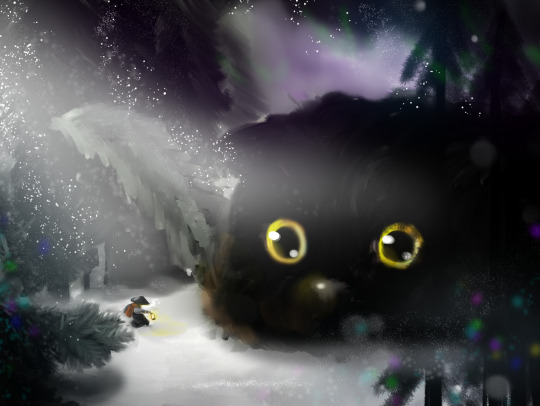







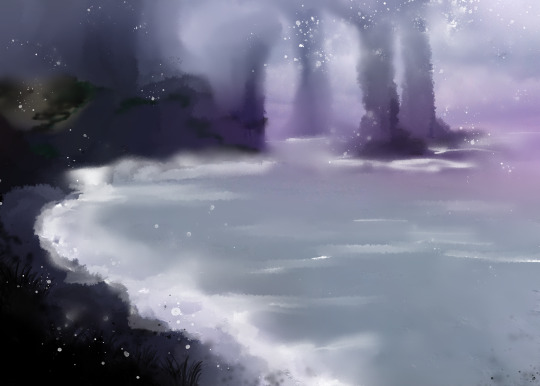




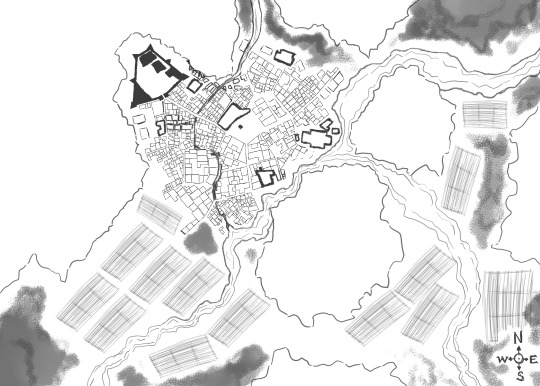




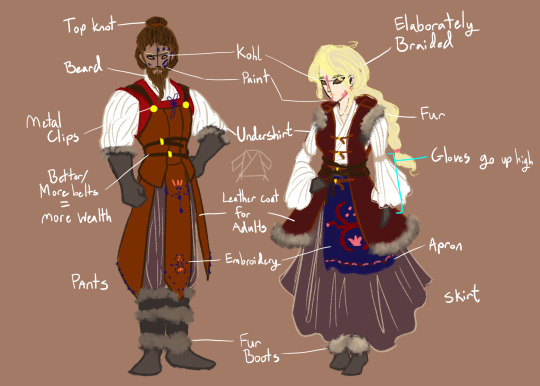


The North
The North is cold, harsh, and human settlements are often isolated from each other. Perpetually dim save for dawn and dusk thanks to the Upper Continent, sharp mountains, harsh winters, and richly colored plants mark the environment. Rumateurs — llama-like beasts with big noses — graze across the moors, seals lay on the ice cold beaches and turn to humans, and beasts that crawl from the Abyss eat human minds. In the East, Demons — shunned by all other races — live in their blood-soaked, feral hivemind. Across the North, it is generally accepted that you look after your own, as there is little room for generosity. Even if there was, it would do neither of you very good; one must learn to survive on one’s own.
The North has officially surrendered in the face of the Philosopher King's power. The Noble Houses are soon to be stripped off their titles and a new government is set to rise—but who will truly hold power in this new world?
Nouveau Thuille
Nouveau Thuille is an isolated city-state with a mafia-like government of oligarchs who claim to reign in the stead of their Once and Future Emperor. Their Gothic architecture fends off year-round snows and industrialization fills the air with Ysse and smoke. While corruption and murder is just the status quo, Nouveau Thuilleans will set it all aside if anyone else tries to tell them otherwise.
"Fitte Thuille, abso'uen."
"For Thuille, the World."
The Saegen Folk
The Saegen Folk make up the rest of the North -- a diverse group of sailors and warlord families. Their culture is filled with song, from cooking and cleaning folk tunes to Sage-sung ballads at religion ceremonies. But even shieldsiblings drill to the rhythm of drums. Loyalty to family is matched by few other cultures in Yssaia.
Amai's Thoughts
Since Arlasaire is from Nouveau Thuille and ALSO since it's the setting of my Assassin Life Sim about Murder and Self-Care, it's a lot more developed on an individual level than some of the other cultures.
Like, I can tell you the details of their music and the history of their theatre and their frozen foods and that their coffee isn't actually coffee from coffee beans but ground from dried mushrooms...
I can tell you which families have power and what they control and produce and what their signature art forms are. I can tell you their family drama from the last ten years -- like how Giluniques was courting Lucienne, even though his father called off the marriage because HER father tried to murder everyone.
I can tell you about how Claudia d'Magnia started hallucinating and no one new how to help her and died tragically.
I can tell you about how Einharde d'Magnia picked up a bunch of disabled orphans and turned them into his personal assassins.
I can tell you what the crests and family words of every house is...
...or was, before the Aftokratoria dismantled them lol #EatTheRich but AMA
#worldbuilding#fantasy worldbuilding#fantasy world#fantasy art#fantasy writing#dark fantasy#writeblr#Yssaia#Amaiguri
20 notes
·
View notes
Text

Brian Griffin, who has died aged 75, was one of the most original and influential British photographers of his generation. His images of Kate Bush, Donald Sutherland, Iggy Pop and Damien Hirst, and his album covers for Echo and the Bunnymen and Depeche Mode, are some of the most famous pictures of the 1980s.
For the cover of Depeche Mode’s 1982 LP, A Broken Frame, Griffin transposed Soviet social realism to a cornfield off the M11 in East Anglia, and the result was named by Life magazine as one of the greatest images of the decade. His virtuosity saw him declared photographer of the decade by the Guardian in 1989.
His work, which has been exhibited globally, is in the permanent collections of the National Portrait Gallery, the V&A, the Arts Council and the Birmingham Museum and Art Gallery.
Griffin’s success capturing the glossy worlds of money and hairspray was rooted in something darker. He was forged in the Black Country, the industrial heartland of the West Midlands, and the influence of the factories, and the harsh light from the furnaces, suffused his early photography. He had a relentless work ethic and would do anything to succeed in a world far removed from that of his upbringing.
He was born in Birmingham, the only child of Edith (nee Moore) and James Griffin, who were both factory workers. The family lived in a two-up, two-down in Lye, where every street had a factory. Young Brian felt that “the whole world appeared to be partly made of metal. Everything you touched seemed to be iron and steel.” After passing the 11-plus exam he went to Halesowen technical school, then went to work at the age of 16.
In 1965 he was making conveyors for readymix concrete plants when the factory foreman suggested he join Hagley camera club, where he picked up a camera for the first time. He then got a job at British Steel and was working as a nuclear pipework engineering estimator in 1969 when everything changed. Devastated by the end of a love affair, he decided to leave his old life behind.
Griffin’s only means of escape was photography, so he put some of his camera club images into a Boots photo album and applied to art colleges. He was accepted into Manchester Art School at the age of 21, where he studied with Martin Parr and Daniel Meadows.
In the college library he devoured books on art, and after graduating and moving to London, he spent weeks at the National Film theatre immersing himself in German and French cinema. Inspired, he began to look for work.
In 1972 he went to see the art director of Management Today magazine. Griffin’s talent was plain to see, and he was immediately put to work. He shot a shadowy monochromatic image of rush hour on London Bridge from the back of a cab, calling it his Metropolis image, after Fritz Lang’s expressionist masterpiece. Prior to this, Griffin had doubted his ability, but now he knew that he could make it as a photographer, he unleashed his artistry.
Through his images for the magazine, Griffin introduced surrealism to the boardroom. His industrial background meant that he clicked with the businessmen who were his subjects, and the captains of industry played ball. He wittily subverted the corporate power of the men he photographed by introducing discordant juxtapositions, building tension. He wound intrigue throughout his work, stopping the viewer in their tracks, making them take time over his images, and his work began to be recognised.
Ambitious, he wanted to expand his repertoire and earn more money. He understood that the style he had honed in the business world would translate into the pop sphere, where post-punk bands were eschewing bondage trousers in favour of being suited and booted. He went to Stiff Records and photographed Elvis Costello and the Attractions and Ian Dury and the Blockheads.
Recognition followed and commissions flooded in. He worked for Esquire, Rolling Stone, the Face, Time Out, the Sunday Times and the Observer, in advertising for British Airways, BMW and Levi Jeans, and photographed Brian May in a series for Sony Walkman in 1980.
That year he moved to Rotherhithe, a working-class area of south London on the banks of the Thames. He loved the place, recognised its people and was to stay there all his life. He set up a studio from where he continued to push the boundaries of the conventional. Using his background in engineering, allied to his innate creativity, he built lighting machines and used knicker elastic and ping-pong balls to create startling special effects in an analogue age.
Some experiments led to happy accidents: his highly regarded 1984 image of Siouxsie Sioux, intended as a double exposure, was in fact a triple: “It was wrong, but so right,” he said.
In the days before social media, aside from magazines, the main showcase for a photographer’s work was on walls, be they in galleries or town centres. Griffin’s first solo London exhibition was at Contrast Gallery in 1981, and the posters of his work for bands such as Spandau Ballet and Ultravox were plastered across the land. His family finally saw his work and were proud: they had always wanted more for Brian than factory life.
As well as portraiture, he produced numerous documentary projects. In 1986 he photographed construction workers at the Broadgate development in the City of London. At the time he was still reeling from the death of his father from lung cancer, due to a life inhaling cast-iron dust. The project allowed Griffin to pay homage to his father and to all working people: he monumentalised the men “like knights lying in state in a cathedral with their swords”.
In 1989 he left still photography to make television commercials, music videos and short films, but returned a decade later. In 2003 he produced a project to aid Birmingham’s bid to become the European City of Culture. He worked promoting the 2012 London Olympics and in 2015 his photo-essay, Himmelstrasse, movingly documented the railway tracks in Poland that transported people to Nazi death camps. He continued to work up until the end of his life, with new projects still in the pipeline.
He had more than 20 monographs published in his lifetime and won numerous awards. In 2013 the Royal Photographic Society awarded him their Centenary Medal, and the following year he received an honorary doctorate from Birmingham City University for his lifetime contribution to his home city.
Griffin’s 1980 marriage to the photographer Frances Newman ended in divorce. Their daughter, Layla, died in 2020; he is survived by their son, Danz, and three grandchildren.
🔔Brian James Griffin, photographer, born 13 April 1948; died 27 January 2024
Daily inspiration. Discover more photos at Just for Books…?
10 notes
·
View notes
Text
(1991) Temple Of the Dog - Say Hello 2 Heaven
Live at Moore Theatre 90’s
#Chris Cornell’s vocals wow!#that ending#music#rock#90’s rock#chris cornell#temple of the dog#soundgarden#audioslave#AMAZING#vocals#eddie vedder#grunge#grunge metal#very rare#RARE LIVE#tumblr#live#song#video#grunge rock#black and white#fashion icon#1991#90s#90’s
132 notes
·
View notes